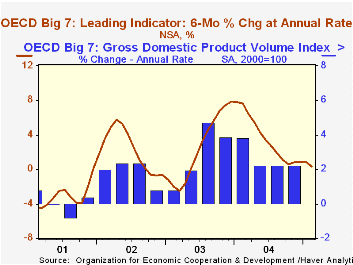 Global| Apr 11 2005
Global| Apr 11 2005OECD Leaders Decline Broadly
by:Tom Moeller
|in:Economy in Brief
Summary
The Leading Index of the Big 7 OECD economies slipped 0.3% in February following three consecutive months of gain. The decline reversed the earlier improvement in the index's six month growth rate and it fell to 0.3%, the weakest in [...]

The Leading Index of the Big 7 OECD economies slipped 0.3% in February following three consecutive months of gain. The decline reversed the earlier improvement in the index's six month growth rate and it fell to 0.3%, the weakest in nearly two years.
During the last ten years there has been a 69% correlation between the change in the leading index and the q/q change in the GDP Volume Index for the Big Seven countries in the OECD.
The 0.1% February decline in the leaders for the European Union (15 countries) was the third in a row and pulled the six month growth rate to 0.5%, it's weakest in nearly two years. The German leaders fell 0.4% m/m and six month growth fell to a barely positive 0.2%. The French leaders slipped for the third consecutive month pulling six month growth to 0.1% and the fourth consecutive monthly decline in the Italian leaders lowered the six month growth rate to -0.9%.
The leading index for the US economy slipped 0.1% following three months of moderate gain leaving six month growth subdued at 1.4%.The leaders for Japan fell 0.8% and six month growth fell to -0.4%.
Growth in the leaders for the UK economy slipped for the fourth consecutive month pulling six month growth solidly negative at -1.6%.The Canadian leaders didn't decline for the first month since last July but six month growth remained a negative 2.7%.
The latest OECD Leading Indicator report can be found here.
| OECD | Feb | Jan | Y/Y | 2004 | 2003 | 2002 |
|---|---|---|---|---|---|---|
| Composite Leading Index | 102.22 | 102.48 | 0.3% | 101.99 | 97.51 | 96.33 |
| 6 Month Growth Rate | 0.3% | 0.9% | 3.6% | 2.5% | 2.3% |
Tom Moeller
AuthorMore in Author Profile »Prior to joining Haver Analytics in 2000, Mr. Moeller worked as the Economist at Chancellor Capital Management from 1985 to 1999. There, he developed comprehensive economic forecasts and interpreted economic data for equity and fixed income portfolio managers. Also at Chancellor, Mr. Moeller worked as an equity analyst and was responsible for researching and rating companies in the economically sensitive automobile and housing industries for investment in Chancellor’s equity portfolio. Prior to joining Chancellor, Mr. Moeller was an Economist at Citibank from 1979 to 1984. He also analyzed pricing behavior in the metals industry for the Council on Wage and Price Stability in Washington, D.C. In 1999, Mr. Moeller received the award for most accurate forecast from the Forecasters' Club of New York. From 1990 to 1992 he was President of the New York Association for Business Economists. Mr. Moeller earned an M.B.A. in Finance from Fordham University, where he graduated in 1987. He holds a Bachelor of Arts in Economics from George Washington University.
More Economy in Brief
 Global| Feb 05 2026
Global| Feb 05 2026Charts of the Week: Balanced Policy, Resilient Data and AI Narratives
by:Andrew Cates






